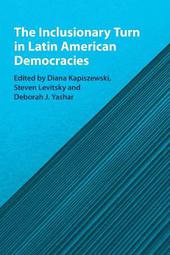
|
The Inclusionary Turn in Latin American Democracies
Paperback / softback
Main Details
| Title |
The Inclusionary Turn in Latin American Democracies
|
| Authors and Contributors |
Edited by Diana Kapiszewski
|
|
Edited by Steven Levitsky
|
|
Edited by Deborah J. Yashar
|
| Physical Properties |
| Format:Paperback / softback | | Pages:585 | | Dimensions(mm): Height 229,Width 152 |
|
| ISBN/Barcode |
9781108816182
|
| Classifications | Dewey:306.2098 |
|---|
| Audience | | Professional & Vocational | | Tertiary Education (US: College) | |
|---|
| Illustrations |
Worked examples or Exercises
|
|
Publishing Details |
| Publisher |
Cambridge University Press
|
| Imprint |
Cambridge University Press
|
| Publication Date |
30 December 2021 |
| Publication Country |
United Kingdom
|
Description
Latin American states took dramatic steps toward greater inclusion during the late twentieth and early twenty-first Centuries. Bringing together an accomplished group of scholars, this volume examines this shift by introducing three dimensions of inclusion: official recognition of historically excluded groups, access to policymaking, and resource redistribution. Tracing the movement along these dimensions since the 1990s, the editors argue that the endurance of democratic politics, combined with longstanding social inequalities, create the impetus for inclusionary reforms. Diverse chapters explore how factors such as the role of partisanship and electoral clientelism, constitutional design, state capacity, social protest, populism, commodity rents, international diffusion, and historical legacies encouraged or inhibited inclusionary reform during the late 1990s and early 2000s. Featuring original empirical evidence and a strong theoretical framework, the book considers cross-national variation, delves into the surprising paradoxes of inclusion, and identifies the obstacles hindering further fundamental change.
Author Biography
Diana Kapiszewski is Provost's Distinguished Associate Professor of Government at Georgetown University. She studies legal institutions in comparative perspective, and field and qualitative methods, and has authored, co-authored, or co-edited five books and multiple articles on these topics. Her first book won the APSA Law and Courts Section's C. Herman Pritchett Award. Steven Levitsky is Professor of Government at Harvard University. He studies democratization and authoritarianism, political parties, and weak and informal institutions. He is currently writing a book on the durability of revolutionary regimes. Levitsky is co-author (with Daniel Ziblatt) of How Democracies Die (2018), a New York Times bestseller published in twenty-two languages. Deborah J. Yashar is Professor of Politics and International Affairs at Princeton University and editor of World Politics. She studies democracy and authoritarianism, citizenship, ethnic politics, violence, and immigration. Her last book, Homicidal Ecologies: Illicit Economies and Complicit States in Latin America (Cambridge, 2018), received the 2019 best book prize from APSA's Comparative Democratization section.
Reviews'This remarkable volume on Latin America's recent inclusionary turn brings together a set of terrifically talented and innovative scholars trained by David Collier and Ruth Berins Collier at UC Berkeley over the past several decades. The wide-ranging nature of the chapters is fitting because the breadth of this inclusionary turn, which included informal venders, evangelicals, and indigenous groups, is one of its most distinctive features relative to the earlier incorporation of labor unions. By showcasing the kind of insightful work the Colliers pioneered along with the kind of substantively important questions they trained their students to ask and answer, the volume serves as a superb tribute to their lasting impact on the field.' Kent Eaton, Professor and Chair of Politics, UC Santa Cruz 'Building upon the extraordinary legacy of Ruth Berins Collier and David Collier, this volume constitutes a tour de force through Latin America's inclusionary policies of the early 21st century. It is a must read for anyone interested in contemporary Latin America, particularly as we move into the political uncertainties of the 2020s.' Tulia G. Falleti, Class of 1965 Endowed Term Professor of Political Science, University of Pennsylvania 'In the last 30 years, democratization in Latin America has opened opportunities for the mobilization of a broad array of popular sector groups seeking an end to the region's historic legacy of social and economic exclusion. This excellent volume provides a comprehensive analysis of this 'inclusionary turn,' and of the political contradictions that have limited its social impact. With contributions from leading scholars in the field, it offers an essential overview of the changing politics of the 21st century.' Robert R. Kaufman, Professor of Political Science, Rutgers
|